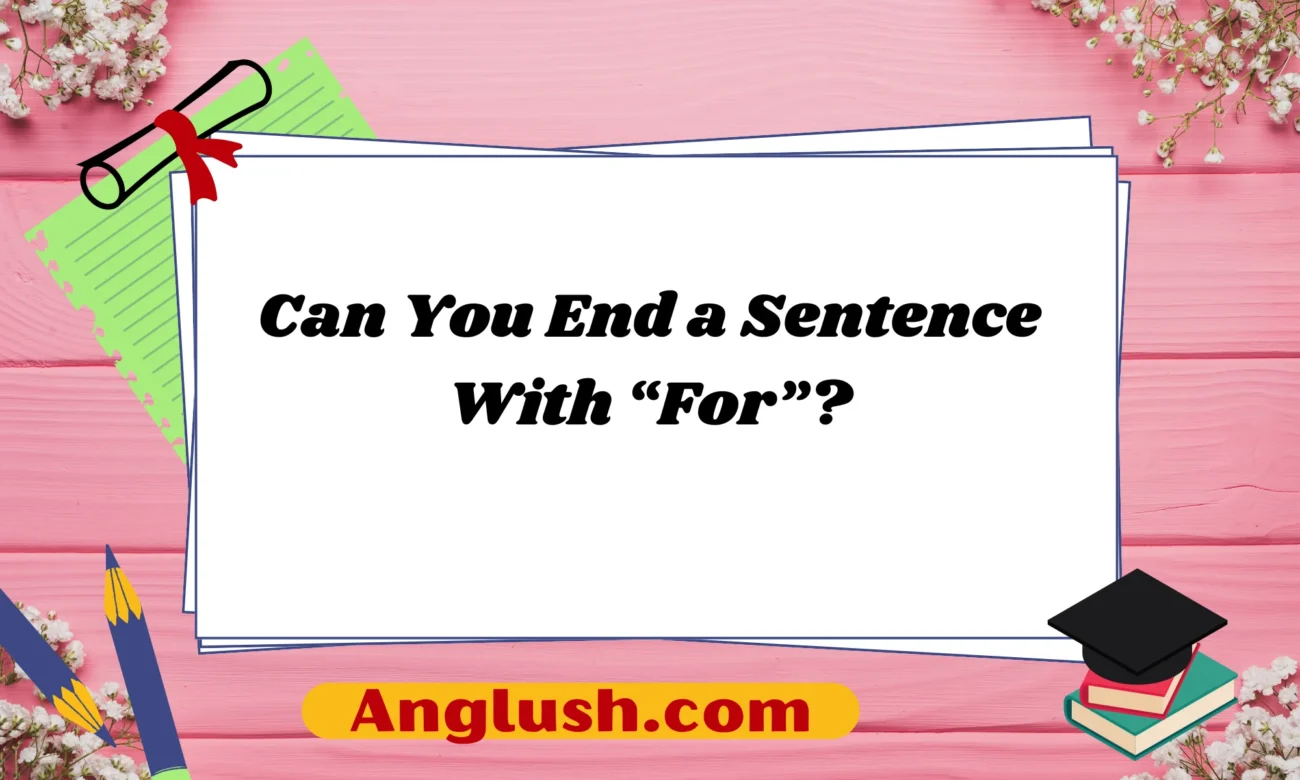Introduction
English grammar is full of complexities, and one of the common questions people ask is whether it’s acceptable to end a sentence with the word “for.” While grammar purists may argue against it, modern English usage allows ending sentences with prepositions like “for” in casual and even professional settings.
In this article, we will explore whether ending a sentence with “for” is grammatically correct, discuss when it is acceptable, and offer alternative sentence structures. Additionally, we’ll provide examples of professional, polite, and casual ways to express the same idea without ending on “for.”
By the end of this guide, you will have a strong understanding of how to use “for” naturally in conversation and writing, along with practical alternatives that fit different tones and contexts.
Is It Grammatically Correct to End a Sentence With “For”?
The short answer: Yes, but it depends on the context.
Traditionally, English grammar rules suggested avoiding ending sentences with prepositions. However, modern English (especially in spoken and informal writing) frequently allows it. This shift is largely due to the natural flow of speech.
For example, consider the following exchange:
- Casual conversation:
Person A: Who is this gift for?
Person B: It’s for my friend. - Revised formal version:
For whom is this gift?
While the second sentence is technically correct, it sounds overly formal and outdated in modern English. The first example is much more natural and widely accepted.
However, in formal or professional writing, restructuring the sentence to avoid ending in “for” is often preferred.
When Is It Acceptable to End a Sentence With “For”?
Here are a few situations where it is perfectly fine to end a sentence with “for”:
- Casual Speech & Texting – In everyday conversation, ending with “for” sounds natural.
- Informal Writing – Emails, social media, and personal messages commonly use this structure.
- Dialogue in Fiction or Storytelling – Writers use it to reflect real speech patterns.
- Questions – Ending with “for” in a question is widely accepted, e.g., Who is this for?
- Colloquial Phrases – Some common expressions naturally end in “for,” like That’s what friends are for.
When Should You Avoid Ending a Sentence With “For”?
Although it’s not grammatically wrong, there are cases where avoiding “for” at the end of a sentence is preferable:
- Formal Writing – In academic papers, business reports, or legal documents, restructuring the sentence is recommended.
- Professional Communication – Emails to clients, job applications, and official letters should maintain a polished tone.
- Avoiding Ambiguity – Some sentences might become unclear when ending in “for.”
Example of a sentence that might be confusing:
- Unclear: This is something I’ve been looking for.
- Better: This is something for which I’ve been looking.
While the first example is acceptable in speech, the second is clearer in formal writing.
Alternatives to Ending a Sentence With “For”
To improve sentence clarity and professionalism, here are some alternative sentence structures:
- Reword the Sentence
- Who is this for? → For whom is this intended?
- That’s what I’m here for. → I am here for that purpose.
- Use “Which” or “Whom”
- This is the person I was waiting for. → This is the person for whom I was waiting.
- Restructure the Sentence
- This is something I’ve been searching for. → I have been searching for this.
- Use a Different Phrase
- This is the opportunity I’ve been hoping for. → This is the opportunity I have been awaiting.
These alternatives maintain the intended meaning while making the sentence sound more formal.
11 Texting Examples Using Alternatives to “For”
Here are practical examples of restructured sentences that work well in different scenarios:
Casual Texting:
- “Who is this gift meant for?” (Alternative: Who is supposed to receive this gift?)
- “That’s the reason I came here for!” (Alternative: That’s why I came here!)
- “This is what I’ve been waiting for!” (Alternative: I’ve been waiting for this!)
- “I have something special planned for you.” (Alternative: I’ve planned something special for you!)
Professional & Polite Texting:
- “Is this the update you were asking for?” (Alternative: Is this the update you requested?)
- “I found the solution I was looking for!” (Alternative: I found the solution I needed!)
- “Here’s the information you were hoping for.” (Alternative: Here’s the information you requested.)
- “That’s exactly what I was aiming for!” (Alternative: That was my exact goal!)
Formal & Business Texting:
- “This is the answer I was searching for.” (Alternative: This is the answer I sought.)
- “The report you were waiting for is ready.” (Alternative: The report you requested is now available.)
- “That’s the decision we were preparing for.” (Alternative: That’s the decision we anticipated.)
Each of these alternatives maintains a natural tone while improving clarity and professionalism.
Final Thoughts
Ending a sentence with “for” is not a strict grammatical error, but whether you should do so depends on the context. In casual speech and everyday writing, it is completely acceptable. However, in professional, academic, or formal settings, rewording your sentences can improve clarity and sophistication.
By using the alternatives provided in this guide, you can enhance your writing and communication skills while maintaining a polished and professional tone. Whether you’re texting a friend, writing an email, or preparing a business report, you now have a variety of ways to avoid ending a sentence with “for” while keeping your message clear and engaging.

